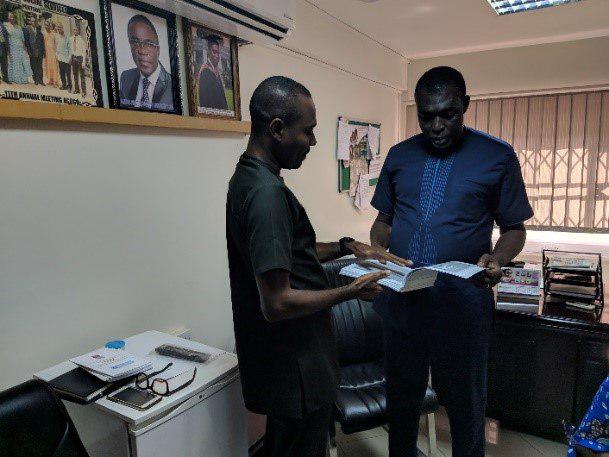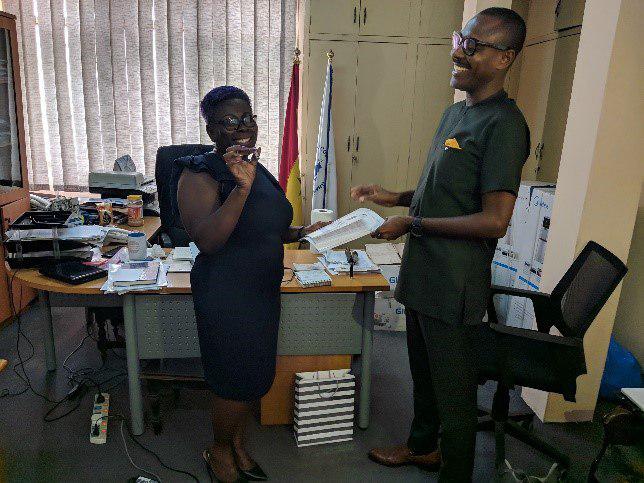Integrity curriculum for students introduced
A national integrity curriculum designed for Ghanaian students from Junior to Senior High in order for them to fully understand corruption, its nature, impacts and how to avoid it has just been developed.

It consists of six intensive modules, each with in-class sessions preceded and followed by activities, written assignments and project works.
Students and teachers will benefit from the rich academic and practical focus offered by the first national curriculum in anti-corruption.
The Basics in Integrity curriculum comprises of a Facilitator’s Manual, Students’ Reader for students and an animation of the two.
The Basics in Integrity Education curriculum, was developed by LeadAfrique International in partnership with the National Center for Curriculum and Assessment (NaCCA) of the Ministry of Education.
It was funded by STAR-Ghana Foundation. The next phase of the project is to gain wider acceptance by all stakeholders interested in the ethical development of Ghana’s young people.
In furtherance of this, the leadership of LeadAfrique International have began calling on the education units of the major religious bodies in the country to adopt this curriculum that teaches young people ethics and integrity in a structured and consistent way.
According to the 2010 population census by the Ghana Statistical Service, 83.3 per cent of Greater Accra region’s population are Christians with the Pentecostal/Charismatics Christians making up 44.6 per cent. Muslims making up a remarkable 11.8 per cent of the population.
The quest to see this curriculum adopted by all schools have seen LeadAfrique International making calls on the Christian Council of Ghana and three of the religious education units that control a large number of schools in Ghana; Catholic Education Unit, Adventist Education Unit and Pentecost Social Services
Speaking with Mrs. Ashun, the General Manager of Catholic Schools, she said ‘the Catholic Education unit meets once every year with the managers to plan and strategise programmes and activities.
With 958,720 students nationwide across our educational institutions, getting the curriculum institutionalised in Catholic Schools will greatly help to cultivate a new generation who do the right thing”.
The Catholic Education Unit, for instance, control a large number of the nation’s schools and having them adopt this curriculum is a great towards achieving high standards of integrity.
Also, the entire Catholic Diocese is on a mission to imbibe integrity in the youth as Most Rev. John Bonaventure Kwofie, the Bishop of the Sekondi Diocese said “the church has a role to play in checking corruption and it is time for other religious bodies to take a firm stance to fight the canker”.
That, he said was the best way to ensure a society free of corruption and other environmental issues.

The issue with corruption is undoubtedly bothering everyone in the country but the struggle is with finding a solution that will work.
This was made evident in our meeting with the heads of schools for the Seventh Day Adventist church as they raised the concern as the Basics in Integrity Education Curriculum has not been made a subject to be taught in schools.
“Well, that is why we are here. If the Seventh Day Adventist adopts this and can be taught during worship sessions in the schools or on a monthly basis during church service, it can make a difference. If the members of the church and schools can be taught to do the right thing, integrity can become the hallmark of the members of the church and the ripple effect will be massive”, Mr Michael Ohene-Effah, Co-Founder of LeadAfrique answered.
The Adventist Education Unit has under its umbrella 29 schools in the Greater Accra region and 7 SHSs across the country.
The call on the Director of Pentecost Social Services was to find partnership opportunities between LeadAfrique and the Church of Pentecost.
Under the church’s 5-year strategic plan (Agenda 2025), Possessing The Nations, Apostle Eric Nyamekye, the Chairman of The Church of Pentecost said, the purpose of Agenda 2025 is to “equip the church to transform every sphere of society with values and principles of the Kingdom of God.” This, among other things include people who are ethical and of integrity.
Elder Richard Amaning, the PENTSOS Director said, “there are currently 86 schools that are owned by The Church of Pentecost and some of these schools have as many as 1,300 students and 25 teachers. Rather than having these students play around during the entire extra-curricular activity period, these students can be taught some of the topics in the Integrity Manual”.
If the over 60,200 students in Pentecost schools can be taught to do the right thing, without being told or influenced by the presence of others, the issue of corruption will be drastically reduced.

To extend the use of the manual among the members of the Christian Council of Ghana, the point of exploration currently lies in the World Day of Prayer. Moving forward, the manual will have to be taught to facilitators in the local languages to enhance the smooth delivery to their participants.
“You know, we are also working on integrity at the moment and working together on this will be very great. We even have Integrity clubs in 27 SHS. What we do not have is a manual. We can begin by partnering to let the groups use the manual during their meetings”, were the words of Mrs Joyce Larko Steiner.
If the groups in these SHSs and the member churches of the Council begin to change their ways for the better, that will be an average of over 200,000 with dignity who can stand up to do the right thing irrespective of where they find themselves. We believe that this curriculum is a laudable one and its acceptance in the basic schools in the country will go a long way to make a huge difference.